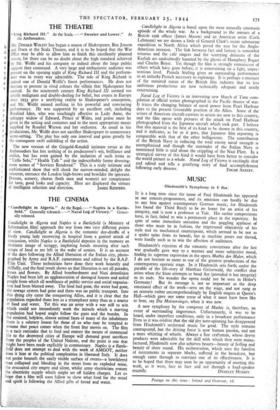MUSIC
Hindemith's Symphony in E flat.
It is a long time since the name of Paul Hindemith has appeared in our concert-programmes, and its omission can hardly be due to any bias against contemporary German music, for Hindemith has found the Third Reich to be no home for an artist of his integrity, and is now a professor at Yale. His earlier compositions have, in fact, failed to win a permanent place in the repertory. In spite of some immediate sensation and the goggling applause of those who must be in fashion, the impersonal objectivity of his style and its mechanical counterpoint, which seemed to be not as a spider spins from its bowels, but as machine pours out thread, were hardly such as to win the affection of audiences.
Hindemith's rejection of the romantic conventions after the last war gradually gave way to a warmer and more subjective mood,
finding its supreme expression in the opera Mathis der Maler, which
I do not hesitate to name as one of the greatest productions of the contemporary operatic stage. In it Hindemith sets forth; under the parable of the life-story of Matthias Griinewald, the conflict that arises when the State attempts to bend Art (provided it has integrity) to its ends. No wonder the opera could not be seen in Hitler's Germany! But its message is not so important as the deep
emotional effect of the work—seen on the stage, and not sung as an oratorio rather uncomprehendingly by English singers at Queen's Hall—which gave one some sense of what it must have been like to hear, say Die Meistersinger, when it was new.
A new symphony by the composer of Mathis is, therefore, an event of outstanding importance. Unfortunately, it was to be heard, under imperfect conditions, only in a broadcast performance Even so it was evident that the old dry note-spinning has disappeared from Hindemith's orchestral music for good. The style remains contrapuntal, but the driving force is now human passion, and not a mere whirring of wheels. Always a fine craftsman, whose dryest products were admirable for the skill with which they were manu- factured, Hindemith now also achieves beauty—beauty of feeling and beauty of sheer sound. His orchestration, which uses the families of instruments in separate blocks, suffered in the broadcast, but enough came through to convince one of its effectiveness. It is to be hoped that there may soon be an opportunity of meeting this work, as it were, face to face and not through a loud-speaker
Postage on this issue : Inland and Overseas, Id.


























 Previous page
Previous page